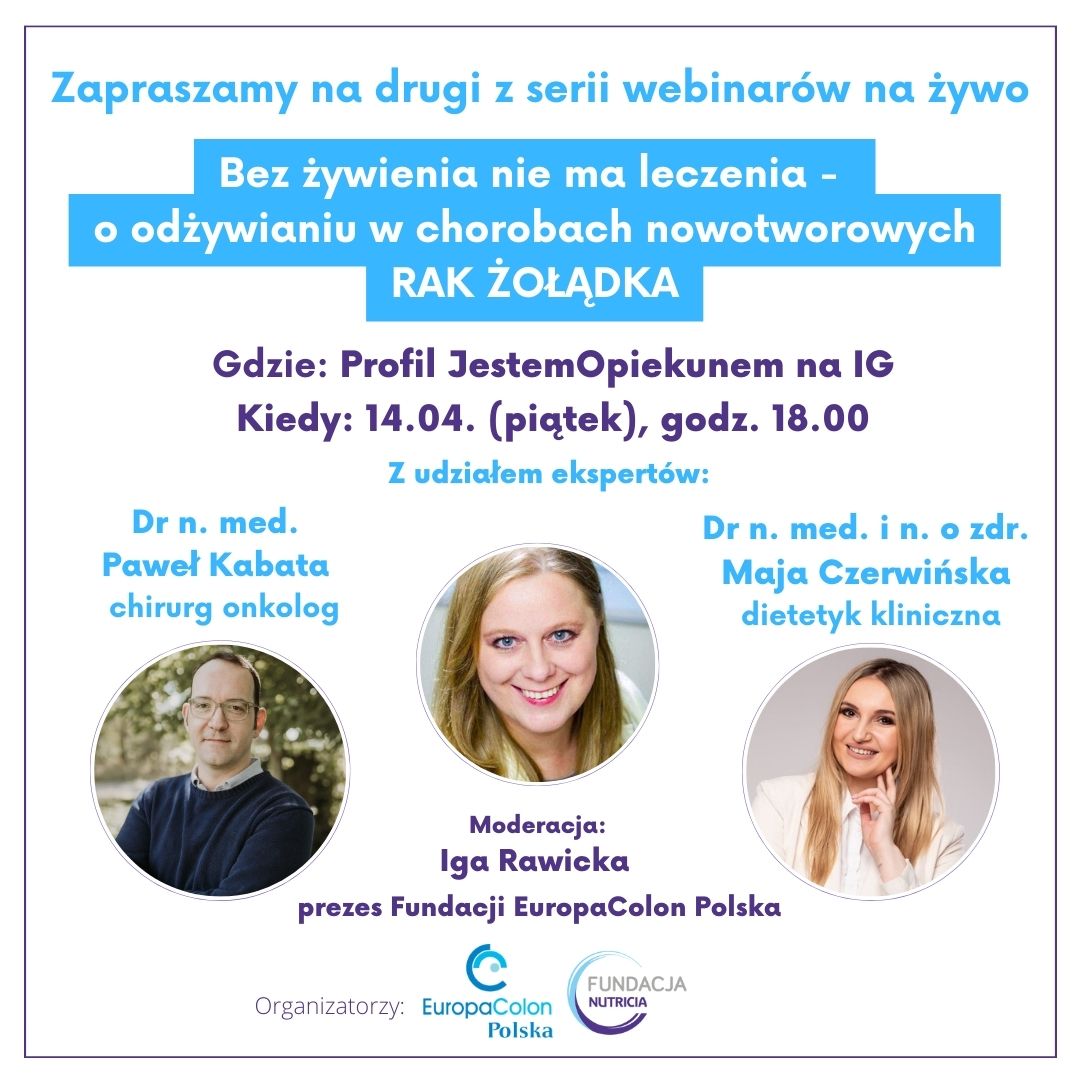Even the best cancer therapy may not help,
if the patient is not properly nourished
Getting enough essential nutrients into the body of a cancer patient can be difficult for a number of reasons. As a result, at least one in three cancer patients struggles with malnutrition. To raise awareness of this problem, the Nutricia Foundation, together with the EuropaColon Poland Foundation, has started a series of educational webinars on the @JestemOpiekunem channel on Instagram, 'Without nutrition there is no treatment', dedicated to nutrition in cancer.
Between 30% and 85% cancer patients experience symptoms of malnutrition or cachexia. The risk of malnutrition itself is present in virtually every type of cancer, with the highest risk in patients with upper gastrointestinal cancers - oesophagus, stomach, pancreas, as well as colorectal and head and neck cancers. Many factors contribute to the development of malnutrition. The main one is the disease and its consequences related to loss of appetite, gastrointestinal complaints, impaired swallowing, and difficulties in preparing and eating food independently.
- Every oncology patient, especially those diagnosed with gastrointestinal cancer, should undergo a nutritional screening assessment. It is in gastrointestinal cancers that malnutrition even affects more than 80% patients -. underlines Iga Rawicka, President of the EuropaColon Polska Foundation, working to raise public awareness of gastrointestinal cancers.
Although proper nutrition should be considered an indispensable part of the healing process, this is not always the case. Meanwhile, when a sick or convalescent patient is unable to cover his or her, often increased, nutritional requirements with a traditional diet, he or she may be at risk of malnutrition.
– Even The best therapy, the most modern medicine will not help if the patient is not properly nourished. So he or she does not receive the right amount of energy, i.e. calories, and the necessary nutrients, of which protein is the most important. I often use such a figurative comparison - most tables have four legs. Basic cancer treatment - surgery, chemotherapy and radiotherapy - are still only three legs of the table. Without the last leg, i.e. nutritional support, the table can tip over - the explains Dr Paweł Kabata, medical oncologist surgeon.
Malnutrition is also a disease
Poor nutritional status, i.e. malnutrition, has many consequences that affect the healing process and subsequent recovery. Very often, it can also result in lowered immunity, which can lead to more frequent infections and postoperative complications, which in turn translates into a longer hospital stay for the patient.
– Most patients realise that what they eat matters, but underestimate how much. They come for help when the problems resulting from malnutrition are already at a very advanced stage. Preventing malnutrition is better than treating it. I can see the difference between patients who are properly nourished and those who lose weight - their muscle mass decreases, and as a result they struggle earlier and more often with the effects of malnutrition, such as chronic fatigue or lowered immunity - says Maja Czerwinska, MD and PhD, clinical dietitian.
One method of supporting the healing and recovery process can be medical nutrition in the form of oral nutritional supplements (ONS for short). Oral Nutritional Supplements). In a small volume, they contain essential nutrients such as, for example, protein , which is the main building block of the body and for which the requirement in a cancer patient is almost twice as high as in a healthy person, and omega-3 fatty acids, which can have an impact on reducing inflammation in the cancer patient and thus contribute to improving appetite, reducing weight loss and muscle mass. Incorporating medical nutrition as early as the time of diagnosis can help to strengthen the patient prior to treatment, reduce the risk of discontinuation due to patient malnutrition and thus increase the chance of timely completion of therapy.
The need for nutritional support during oncology treatment is important in any type of cancer, but particularly in cancers where the risk of developing malnutrition is greatest, including: head and neck, lung, colon, stomach and pancreas, during preparation for chemo- and radiotherapy, during and after chemo- and radiotherapy and in the perioperative period.
Without nutrition there is no treatment
There is an ongoing need to build awareness of the role of nutrition in cancer, so a series of webinars on three types of cancer - colorectal, stomach and pancreatic - has been launched. The events are moderated by President of the EuropaColon Poland Foundation, Iga Rawickawhich was awarded the 'Swallow of Hope' in the category Leader of Oncology Patient Organisations at the recent 11th Oncology Patient Forum organised by the Polish Coalition of Oncology Patients Foundation.
Knowledge on nutrition in cancer is shared by experts:
- dr n. med. Paweł Kabata, an oncological surgeon from the Department of Oncological, Transplant and General Surgery at the University Clinical Centre in Gdansk,
- MD and PhD Maja Czerwinska, clinical dietitian from the nutrition team at the Medicam Specialist Hospital in Gryfice, lecturer at the Pomeranian Medical University in Szczecin.
- The webinars are aimed at patients at different stages of cancer and their carers and aim to raise awareness of the important role nutrition plays in cancer. Each meeting will focus on a different cancer - the Iga Rawicka explains.
The webinar with experts on nutrition in colorectal cancer can be viewed free of charge on the Nutricia Foundation channels (on the profile on on Instagram @IamCaregiveron zywieniemedyczne.pl) and EuropaColon Foundation Poland ( LinkedIn, YouTube, Twitter: @EuColonPolska
Facebook: @EuropaColonPoland).
The next webinars are coming up in April:
- 14 April (Friday) at 18.00 - please join us for a webinar on nutrition in gastric cancer,
- 27 April (Thursday) at 18.00 - the meeting will focus on nutrition in pancreatic cancer.

